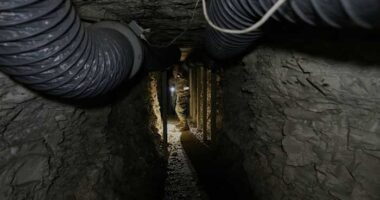Share this @internewscast.com

The Trump administration is creating new hurdles for renewable energy projects, making good on a pledge to staunch conservatives, while causing tension with some moderate Republicans.
The moves are expected to create issues for the renewable energy industry, and critics argue that they could raise power prices.
Leah Stokes, an environmental politics professor at the University of California, Santa Barbara, noted that “rational Republican senators who wish to keep electricity both reliable and affordable would see these policies as very harmful.”
President Trump’s significant revision, dubbed his “big, beautiful bill,” reduced incentives for wind and solar energy, which were originally included in the Democrats’ 2022 Inflation Reduction Act. This change is expected to hinder the development of the growing renewable energy sector.
And in recent weeks, his administration has taken further actions to hamper wind and solar power.
Right after the bill’s enactment, Trump urged the Treasury Department to adopt a stringent stance on determining eligibility for the remaining tax credits.
Additionally, the Interior Department declared it would implement a more rigorous review procedure for wind and solar projects, a decision that will likely slow down their approvals.
These increased review processes extend beyond just wind and solar farm authorizations, also affecting various activities, including grants and evaluations related to endangered species impacts.
Ben Norris, vice president of regulatory affairs with the Solar Energy Industry Association, said he expects that some of these reviews would not only delay projects on public lands but could have similar effects on projects that are on private lands.
“We are hearing about dozens, if not hundreds of projects in the aggregate that otherwise are totally sited on private lands, totally permitted by state and local authorities, but that the Interior Department seems to have found a way to put into limbo, at least for a time,” Norris told The Hill.
Meanwhile, the Interior Department said last week that it would try to block projects that take up a lot of room, which is expected to primarily hurt solar and wind projects. And, the department said last week that it would weigh “whether to stop onshore wind development on some federal lands and halting future offshore wind lease sales.”
It also moved this week to try to cancel an already approved wind project in Idaho.
The Environmental Protection Agency on Thursday separately announced it would move to claw back funds under a $7 billion rooftop solar program.
Norris said that “without a doubt, we have concerns” about the administration’s policies. But, he also expressed some optimism about the future.
“Despite this kind of initial onslaught, we’re not aware of anything that has been canceled. There are certainly some unexpected delays, but that’s kind of part and parcel of developing big infrastructure projects,” he said when asked about the administration’s recent policies. “The fundamentals in terms of supply and demand for solar remain outstanding.”
Stokes had similar sentiments, noting the significance of the tax credits in the Democrats’ 2022 law.
“We still made two steps forward. Maybe we’re one step back. We’re still one step forward,” she said. “You can’t uninstall all the solar and batteries that went in, in the last three years.”
President Trump has long expressed disdain for renewable energy, especially wind. He said before taking office that he’d like to see no new wind energy be constructed during his tenure.
However, negotiations over the “big, beautiful bill” revealed a split within the Republican Party about how aggressively to target renewable energy incentives.
As moderate lawmakers managed to get some concessions to slow the termination of green tax credits, Trump apparently promised to go after renewable energy through the executive branch. That’s what led to last month’s directive to the Treasury Department, instructing it to restrict provisions that protect the industry “unless a substantial portion of a subject facility has been built.”
This week, that effort met pushback from Sens. Chuck Grassley (R-Iowa) and John Curtis (R-Utah), who placed holds on Trump nominees over concerns about what could fall under the Treasury Department rule.
“Until I can be certain that such rules and regulations adhere to the law and congressional intent, I intend to continue to object to the consideration of these Treasury nominees,” Grassley said in a statement in the congressional record.
Grassley and Curtis are not the only ones pushing back. Politico Pro reported this week that Nevada Gov. Joe Lombardo (R) wrote a letter to Interior Secretary Doug Burgum to lament that administration policies have “frozen” solar projects.
Meanwhile, Rep. Chip Roy (R-Texas), who championed major cuts to renewable incentives, said “Ignore them,” referring to Grassley and Curtis, in a social media post.
The Trump administration’s agenda has called for the general expansion of fossil fuels as well as power-hungry data centers while it has cemented hurdles for renewables.
However, Derrick Flakoll, a senior policy associate at BNEF, said policies that are bad for renewables don’t clear the way for other types of energy to come online to replace it, meaning power prices could rise.
“Material availability of other technologies is pretty bottlenecked right now,” Flakoll said. “There’s a lot of wind and solar and storage. It’s cheap. You can build it quickly, so I don’t know that it really clears the way for much.”













